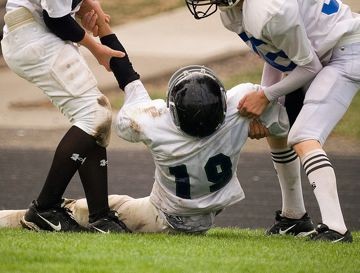John Monfredo: How Worcester Public Schools are Dealing With Concussions
Saturday, October 13, 2012

Sports can be great for a teen , but injuries do happen.
Sports are a great way for teens to stay healthy while learning important team-building skills, but there are risks to pushing the limits of speed, strength and endurance. Athletes who push the limits sometimes don’t recognize their own limitations—especially when they’ve suffered a concussion. Many teens don’t recognize that there is a problem, but they know something is hurting. Anxiety over these injuries has had comes awareness about the danger of concussions being seriously looked by high schools and colleges.
Concussions do not require a direct hit to the head – consider a whiplash type injury. Anytime the brain moves quickly with the skull, a concussion is possible. A concussion is a brain injury caused usually by a bump or blow to the head. This sudden movement interferes with brain function which causes a disruption and affects how parts of the brain communicate. Concussions are also not limited to sports as they can result from a car crash, physical education class or slipping on the ice.
Symptoms of a possible concussion include headaches, nausea/vomiting, sensitivity to noise or light, balance problems, and feeling fatigued. In addition, the long-term after effects can be even more serious. The victim of a concussion can have problems concentrating or remembering new information, difficultly organizing tasks, as well as suffering from depression, sadness and irritability.
Many states such as Massachusetts have set guidelines for schools to follow to address this issue. The Massachusetts Department of Public Health has sent to each school district the State policy on what schools need to do to make everyone (coaches, parents and students) aware of the serious nature of concussions.
According to the Massachusetts Department of Health, there are over 200,000 students involved in athletics with an estimated 36,000 student athletes a year experiencing a possible concussion. Therefore, regulations have been issued by the Department of Health. The regulations outline 17 topic areas that school policies should address, persons responsible for implementation of school policy and procedures, annual training requirements, documentation of physical examinations, pre-participation of head injury reporting forms, medical/nursing review of reports of head injury during the season, medical clearance to return to play, notification to parents when an athlete has been removed from play and much more.
Headed by their Director of Athletics, David Shea, the Worcester Public Schools has been extremely vigilant in adopting these regulations. Mr. Shea stated, “We take this issue very seriously and much time and effort has gone into making sure that our coaches, students and parents know what a concussion is and how we will implement the regulations. Students are now accepting the advice and most athletes are not attempting to be “macho” and play hurt."
Mr. Shea went on to say that when in question, decisions are always made in what is best for the student. He stated that he would rather error on the side of being too cautious, for we have to remember that these are students first and athletes second. However, there is still a concern with young athletes not reporting injuries for many try to avoid being held out of play.
Workshops have been given to all coaches and students before the season starts on all sports. Many times a student goes through the workshop several times for if the student plays baseball, football and track the student would have three workshops. Informational sheets are reviewed with the athletes and parents also receive fact sheets about concussions and what to do if they think that their child has a concussion. Parents are also made aware of the process for getting their child examined and what will happen if a suspected injury occurs.
Furthermore, emphasis is stressed on making sure that the athlete wears the right protective equipment for their activity (such as helmets, padding, skin guards, and eye and mouth guards). Both the school and the parents work together to make sure that the athlete has an annual physical exam to assure that they are sufficiently healthy for athletic activity. The student must be examined by a licensed physician, nurse practitioner or physician’s assistant prior to a student’s participation in competitive athletics and it must be done annually.
According the Mayo Clinic Staff, the best treatment for concussions is rest for this will allow the brain to recover. The America Academy of Pediatrics recommends both physical and mental rest for children. This means avoiding general physical exertion as well as activities that require mental concentration, such as playing video games, watching TV, texting or using a computer.
School workloads should also be temporarily reduced.
For headaches, they recommend using acetaminophen (Tylenol or others). Avoid other pain relievers such as ibuprofen (Advil, Motrin, others) and aspirin, as there’s a possibility these medications may increase the risk of bleeding.
Finally, if you or a child sustains a concussion while playing sports, always ask your doctor or your child’s doctor when it is safe to return to play. Resuming sports too soon increases the risk of a second concussion and of lasting, potentially fatal, brain injury.
Related Articles
- John Monfredo: Anti-Bullying Programs a Must for Worcester Schools
- John Monfredo: Combining Health and Literacy Essential for Our Children
- John Monfredo: Dental Care Improving Lives in Worcester Schools
- John Monfredo: Get Your Child Off to the Best Start this School Year
- John Monfredo: Help Needed to Address Homeless in Our Schools
- John Monfredo: A New Approach to Meeting the Needs of Latino Students
- John Monfredo: Addressing Absenteeism in the Early Grades




 Delivered Free Every
Delivered Free Every
Follow us on Pinterest Google + Facebook Twitter See It Read It